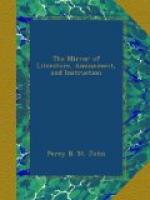Cats Horticulturists.—Cat Mint is a species of Nepeta. It is covered with a very soft, hoary, velvet-like down, and has a strong, pungent, aromatic odour, like penny royal or valerian, that is peculiarly grateful to cats, whence its specific and English names. These animals are so fond of it, that it is almost impossible to keep them from it, after being transplanted. Ray and Miller, both assert, however, that cats will never meddle with such plants as are raised from seed. Hence the old saying,
“If you set it,
The cats will eat it;
If you sow it
The cats don’t know it.”
P.T.W.
Beef-eaters, or yeomen of the guard, are stationed by the sideboard at great royal dinners. The term is a corruption from the French buffetiers, from buffet, sideboard.
A Lion Killer.—Lions abound in the west of India. A gentleman assured Captain Skinner that he had, in one season, killed forty-five in the province of Hissar, alone. None of them were large, but he mentioned having met with one of uncommon beauty; its skin was of the usual tawny colour, but its mane a rich glossy black, as was also the tuft on the tail.
Vultures.—On passing the carcass of a bullock (says Captain Skinner,) we had a proof of the keenness of the vulture’s scent. An hour before not one was seen; nor was the place, being so wild and far removed from all habitations, likely to be haunted by them: yet now they thronged every tree in the neighbourhood. There could not have been less than four or five hundred.
Jackalls.—In some parts of India the howling of innumerable jackalls is never out of your ear, from the minute night falls to the first dawn of day. Captain Skinner says, until he became familiar to the screaming sound, he used to start from his sleep, and fancy some appalling calamity had driven the inhabitants of a neighbouring town to rash forth in fear and madness from their homes. Such frightful clamour might attend an earthquake or a deluge. The animals come up close to your very doors in large packs, and roar away without any apparent object, frequently standing a longtime in one place, as a dog does when “baying the moon.”




